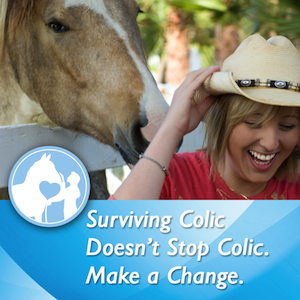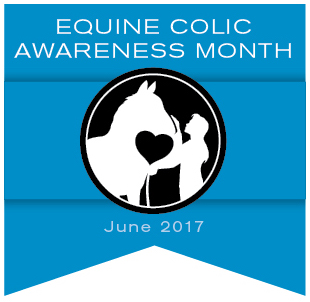 2013 Equine Colic Awareness Month Series Part 4 of 4
2013 Equine Colic Awareness Month Series Part 4 of 4
When your horse colics, knowing the common signs, calling the vet, and getting through even a minor colic is a temporary band-aid, not a permanent fix. Throughout the month of June, the second annual Equine Colic Awareness Month, we will be discussing the importance of colic prevention, why horses are prone to colic, how poor digestive health as a result of feeding and management may lead to colic, and what you can do to keep your horse’s gut healthy to reduce colic risk. Surviving colic doesn’t stop colic. Make a Change.
If you’ve been following along with the Colic Awareness Month article series, we have finally reached the “so what.” We’ve discussed why it’s so important to stop colic before it can start, rather than just managing it when it is already happening. We’ve also discussed why we – or our feeding and management practices – may be part of the reason horses are so prone to colic and why the resulting poor digestive health may cause colic.
We started with the bad news, so that we could end by encouraging you with the good news:
There are steps you can take to help prevent colic in your horse!
Before we go further, we must make it clear: not all colic is avoidable. Some causes, such as tumors, may simply be unavoidable. However, as we explained in Part 3, the underlying causes of most colic cases may be related to poor digestive health. And that we can do something about.
Steps to Make Your Horse a Colic-Free Zone
Many cases of idiopathic colic may be prevented in the first place by taking steps to encourage digestive health, minimize the impact of less-than-perfect necessities of management, and diligent monitoring. Here’s what you can do to encourage your horse to be a colic-free zone.
Mimic a Natural Lifestyle as Closely as Possible to Prevent Colic
It is possible to feed and care for horses in a way that mimics how they function in the wild, despite living indoors and engaging in regular work, among other common necessities of the domesticated life.
In nature, a horse grazes up to 18 hours a day. This means the horse is constantly consuming small quantities of high-fiber forages. Breaking this down, the ideal diet consists of feed rich in structural carbohydrate (fiber), consumed a little at a time over a long period of time. Here are some things you can do to achieve a similar result:
- Increase turnout. Horses should be turned out on quality pasture (or with hay) for as many hours of the day as is possible. Around the clock is best, as long as they have access to shelter. Of course, don’t keep them out in severe weather or extreme temperatures which could be dangerous.
- Reduce concentrates. Find healthier ways, such as feeding soaked beet pulp, to get your horse the extra calories he needs for work. Also, recognize that promoting a healthy gut will enable your horse to better absorb nutrients in his feed – reducing the amount of extra calories he needs.
- Feed smaller meals. Most horses are fed grain dumps and several flakes of hay 2-3 times a day. Instead, break meals into more small meals throughout the day. Just like it’s better for us to snack throughout the day, it’s better for horses to be able to graze on their food.
- Provide constant access to forage. Horses should receive 1.5-2% of their body weight in forage daily, and also need it trickling through their systems constantly for optimal digestive health and function.
- Slow intake. Encouraging horses to eat more slowly allows hard feeds more time to digest properly in the foregut as well as keeps a steady flow of forage into the digestive system. Mix chaff in with your horses grain to slow feeding time, use haynets, put a few large rocks in the grain bucket so your horse has to pick around them.
- Make changes slowly. Switch between new types of feed – grains AND hay or pasture – slowly over a period of weeks. If you are moving to a new barn, take grain and hay from the old barn to help give your horse’s hindgut time to adjust. Gradually increase the ratio of new to old feed throughout this time.
Work with Your Health and Feed Partners to Focus on Wellness
Your veterinarian is highly educated and experienced in all aspects of your horse’s health. Likewise, your feed rep understands nutrition. Utilize their knowledge to develop a dietary and management program that is best for your horse’s individual needs. Work with your vet and feed supplier to:
- Develop a nutrition program
- Implement an appropriate deworming program
- Stay up to date on necessary vaccinations
- Provide proper dental care
- Monitor your horse’s digestive wellness regularly
As they say, “an ounce of prevention is worth a pound of cure.” Any time and money you spend to ensure your horse’s wellness may be money saved in emergency visits, travel and treatment at a clinic, or a risky and expensive surgery in the event of a colic.
Supplement to Support Digestive Health in Your Horse
We recognize that many boarding or home-care situations may have necessary limitations that do not allow for implementation of all of the natural care recommendations discussed above. In these cases, it’s important to take steps to fill in the gaps another way.
As understanding of the intricacies of equine digestive health has deepened over the last few years, the market has exploded with products to support gut health in horses. Work with your veterinarian to select a feed supplement that is scientifically researched, tested, and licensed for sale and is well recommended by those who use it. A good supplement will contain ingredients targeted to the healthy structure and function of the entire equine digestive tract to promote total gut health.
Also keep in mind that any product that has gone through the appropriate channels to get licensed for sale in each US state may not be able to provide their research directly to you due to regulatory issues. Be sure to involve your veterinarian, who will be able to access that kind of information.
So, Now What?
Talk to your veterinarian. Your barn manager. Your trainer. An equine nutritionist. Develop a specialized plan to fit your horse’s unique needs and take all the steps you can to promote digestive health and prevent most colics. Now that you know better, do better.
Join the Crusade to pledge your support for this important cause, and to let us know that you take preventing colic seriously. If colic has happened to you and horses you love, share your story with others to get support and to help spread the word that colic is a risk to take seriously.
Surviving colic doesn’t stop colic. Make a Change.






